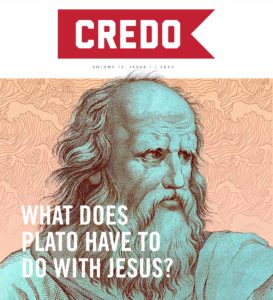Metaphysics concerns our partial understanding of the essential and transcendent truths of reality. Western modernity, and its post-modern progeny, firmly opposes the very idea of metaphysics. There are reasons for this, which we shall briefly touch on. But what about the New Testament? Does it express something we might call Christian metaphysics?
Metaphysics and Truth
T he prologue of John’s gospel is about as metaphysically lush as any literature in the Western canon. John tells us that the Divine Logos is none other than the man, Jesus of Nazareth. Here capital ‘T’ Truth (essential, eternal, transcendent Truth) reaches into our world and is somehow made manifest in contingent and transitory space, time, language and culture. The Word was made flesh and dwelt among us, and in this way God communicates with us a very special ultimate Truth: himself. This is the Truth that redemptively transforms us and sets us free, if we abide in the word of the divine Word.
he prologue of John’s gospel is about as metaphysically lush as any literature in the Western canon. John tells us that the Divine Logos is none other than the man, Jesus of Nazareth. Here capital ‘T’ Truth (essential, eternal, transcendent Truth) reaches into our world and is somehow made manifest in contingent and transitory space, time, language and culture. The Word was made flesh and dwelt among us, and in this way God communicates with us a very special ultimate Truth: himself. This is the Truth that redemptively transforms us and sets us free, if we abide in the word of the divine Word.
Two things should be carefully noted here. The speaker of Truth is not us, but God. Secondly, if we respond to the Word of God spoken into our lives with surrender and trust (the response of belief), then this Word of Truth is redemptively transformative of our very being, such that we are born of the Spirit. This pattern of divinely spoken Word and human response is spelled out seven times via the signs in John’s gospel. The miraculous signs point beyond the tangible miracles and signify the self-disclosure of God: those who have ears to hear and eyes to see the true significance of the signs of God, are saved; those who through pride and rebellion darken their spiritual vision and stop their spiritual ears, are judged. But one way or another, the Word of God always produces a response in us, either faith and salvation, or unbelief and judgment.Like in The Princess Bride, our smart philosophers now confidently assert that Socrates, Plato, and Aristotle were morons. Click To Tweet
Paul also unpacks aspects of the transformative action of God’s redemptive Word. Salvation entails the transformation of our minds (Rom. 12:2), such that we can see, and embrace, the high reality of who Christ really is (Col. 1:15–20) and become new beings in Christ (2 Cor. 5:17). We are not to be conformed to the pattern of this world (a pattern opposed to Truth), but we are to have the Mind of Christ (1 Cor. 2:16). The meaning of the Greek word we often translate as repentance – metanoia – does indeed mean a turning from sin and resting in God’s grace, but this tuning is a divinely enabled transformation of our mind (meta here means ‘totally transformative change’ and noia means ‘of mind’).
Illumination and Transformation
In sum, metaphysical illumination and transformation are integral to the Christian faith. Being miraculously transformed by the Spirit of Truth so that we can see and live in real Reality, is to have the mind of Christ and to see the violent necessities of ‘this world’ as distortions of reality, and – following Christ – to refuse to be bound by the elemental principles of ‘this world.’ Metaphysics – as the word itself indicates – implies a seeing beyond the immediate physical realm and into the spiritual realities on which the natural world rests. The carnal mind cannot see spiritual truth, only the Spirit of Truth enables us, by faith, to see things as they really are on that spiritual plane.
At this point, I can hear the modern protests. Am I trying to turn the gospel into a body and matter-hating Gnosticism? Am I reading the Hebraic New Testament as if it was written by Greek philosophers? I can also hear post-modern and phenomenological protests. Why do I use this metanarrative word “Truth”? All ‘truths’ are constructed and political, all language is inescapably a human artifact, and the Real is never knowable to us as we must always describe ‘the world’ only as it appears to us, never as it actually is.
I will now seek to briefly address the modern and postmodern suspicions of metaphysics, and of Christian metaphysics in particular. What follows may jump around a bit but the picture should come together at the end.
Modern and Postmodern Suspicions
First, Christian metaphysics is staunchly opposed to Gnosticism. The gnostics of the late Classical world believed that those ‘in the know’ would save themselves by their special knowledge and magical passwords, they believed that body and matter were either evil or of no importance, and they were private cults, and hence were never persecuted by the Roman imperium. Christianity was exactly what Gnosticism was not.
In the Church, God saves us, we do not save ourselves via our special magical knowledge. Christ taking up flesh and living in the world of matter, space and time (that God created) makes the body and the world intrinsically valuable. And Christianity was always a public faith, committed to public truth claims – notably that Jesus rather than Caesar is Lord – that got it into public trouble with the Roman Imperium. Christian metaphysics affirms all three of these anti-gnostic stances. Indeed, it could be argued that under the conditions of secular modernity the Church has never been more gnostically inclined, and more urgently in need of the corrective that decent Christian metaphysics would point to.Consumer Christianity means that we can anonymously float in and out of churches looking for an experience that suits our tastes where fellowship, worship, and God are there as addendums to my own choice and felt needs. Click To Tweet
In our day of ultra-mobility and virtuality, the body, physically bonded and located communities, and natural reality itself, are being bypassed in ways that late Classical gnostics could not have dreamed of. The manner in which Christians are atomized by modern consumer culture and can float free from closely-knit communities and the actual physical locality in which they live radically undermines the Christian practice of church life and her localized works of redemptive love. Consumer Christianity means that we can anonymously float in and out of churches looking for an experience that suits our tastes where fellowship, worship, and God are there as addendums to my own choice and felt needs. This is the mindset of our consumer world and it is not a true vision of reality; it is profoundly false and destructive.
Our liberal secular world tends to think of faith as the domain of private and free convictions, separated from the real workaday world and public concerns, just like the gnostic cults of old. And in more doctrinally cerebral churches, we are tempted to think that having the right doctrine is what saves us (just like the ancient gnostics) and evidence of the life and mind of Christ in our daily lives is somehow entirely secondary to our saving doctrines. We have become conformed to this secular consumeristic world in a way that is profoundly at odds with a Christian understanding of reality. We shall come back to this, but metaphysics is a highly practical feature of how we live our lives, for how we think about reality has an enormous impact on what actions and aims we pursue in our daily lives. The vision of the mind determines the assumed parameters of reality and normality in which we act; if we see the world in a different way, we will act differently. And actually, the Christian life entails a radically inverted vision of power and meaning to the ‘natural’ outlook of our highly competitive, non-spiritual, and self-interested workaday worlds.
As mentioned at the outset, modern philosophy is intrinsically suspicious of metaphysics. This needs a little unpacking for anyone interested in Christian metaphysics.
The Removal of Metaphysics from Physics
Modern science starts by throwing out Aristotle. To Aristotle, nature had four causes. We understand ‘material’ and ‘efficient’ causes; i.e., what things are made of and how one thing causally shapes and physically generates another thing. Yet nature also had ‘formal’ and ‘final’ causes prior to modernity. Formal causes concern something’s ‘form’ or its essential nature, and final causes are purposes, as defined by moral qualities and overshadowed by transcendent realities. Dropping formal and final causation from nature made the world into simply material stuff that our knowledge gave us power over such that we could bend the world towards human utility. We would not have the modern age without dropping Aristotle’s formal and final causation, and the many benefits of modern science, finance and power all stem from this move. But so do the great destructions and perils of the Modern Age.
Modernity is deeply shaped by this removal of metaphysics from physics. Now purpose, morality and intrinsic meanings in nature are simply invisible to our knowledge and technology. After the 17th century, traditional metaphysics was still trying to work, and work with the new knowledge we now call science. But this did not work.Immanuel Kant, near the turn of the 19th century, radically solved the problem of metaphysics in the modern age by simply claiming that it was impossible to know reality as it really is. Click To Tweet
Immanuel Kant, near the turn of the 19th century, radically solved the problem of metaphysics in the modern age by simply claiming that it was impossible to know reality as it really is. That is, we only know reality as it appears to us. The way we organize sensory experience and logical reasoning is the only knowledge and reason we have. So metaphysics – knowledge of how reality really is – is simply impossible, and unnecessary. After Kant, modern philosophy became post-metaphysical. Like in The Princess Bride, our smart philosophers now confidently assert that “Socrates, Plato, and Aristotle” were “morons.”
The Post-Metaphysical Outlook
This new post-metaphysical outlook sets up a radical rupture between Nature and Culture. Now (for all practical purposes) the “real” world of Nature is just physical, and physical without any value, purpose or meaning; real things just are. Now Culture becomes the domain of humanly constructed values, meanings and purposes. Even so, these cultural constructs are connected to physical reality because in (natural) reality, power, instinct and physical necessity constructs Culture. That is, Culture is a function of Nature, and the values and meanings of Culture are not really real in their own terms, but are only real when viewed as functions of meaningless and purposeless physical Nature. So the postmodern rejection of any essential or intrinsic meaning is a natural outcome of Kant’s very modern rejection of metaphysics.
The post-metaphysical modern person tends to think that we are now down-to-earth lovers of the physical world, and that anything natural should be accepted, and that we have been liberated from bondage to metaphysical myths that imposed made up notions of ultimate meaning and divine purpose on us, keeping us enslaved to oppressive and repressive fables. We like to think we are “grown up” now and don’t believe fairy tales about transcendent and eternal Reality, but that the “real world” is purely physical and all our natural inclinations are equally valid (even if some of them must be socially controlled).
After Kant, the Lutheran theologian Adolf von Harnack (1851–1930) decided that the New Testament is written by body-and-matter-affirming Hebrews and that anything smacking of Greek metaphysics was a Platonist body-hating perversion of the true Christian gospel. This has remained quite a fashionable stance in modern theology. Shaped by the spirit of our times, we like to read the New Testament through our anti-metaphysical interpretive lens, and seek to make sense of the Scriptures in a way that modern scientific knowledge and a modern understanding of culturally constructed meanings and morals can make sense of. But… actually, the New Testament was written in Greek, it was written to people living in the Greco-Roman world, and its metaphysical stance – as understood in a highly discerning way by the Patristic scholars of the first flowering of Christian theology – has deep sympathies with the broadly Platonist metaphysical outlook of the classical world.We read the New Testament through our anti-metaphysical lens, but the NT was written in Greek to people living in the Greco-Roman world and has deep sympathies with the broadly Platonist metaphysical outlook. Click To Tweet
Christianity and Platonism
To be clear, the Christian metaphysics of the New Testament is not Platonism with a Christian wash. Christian metaphysics shares significant common ground with Plato’s vision of reality, at the same time as being firmly differentiated from Plato and various pagan forms of Platonism in other regards. I will here quickly outline commonalities and differentiations.
To both Christianity and Plato, the world you cannot see is more real than the world you can see. This does not make the visible natural world unimportant, but it does subordinate the claims of natural life to the claims of eternal life. To both Christianity and Plato, the ultimate source of Reality is God, who is Good, and the grounds of all that is. To both Christianity and Plato, the way you gain partial insight into the transcendent realm of Real Truth is via revelation (the gift of God) and via a life of moral and spiritual purification. Of course, Plato lived more than three centuries before our Lord, so a Christian understanding of how the Holy Spirit dwells within us and sanctifies us as we grow into the likeness of Christ is outside of Plato’s understanding. However, the spiritual and moral transformation of the life devoted to God is understood in strikingly similar ways by the New Testament and Plato. Plato is not a merely speculative thinker when it comes to metaphysics – moral and spiritual transformation is the necessary corollary of good metaphysics to Plato.
But here is one striking difference between Plato and Christian metaphysics: history. That God would enter our time and space and become one of us, and that the community Christ founded would be a historically located and formational community for all comers, is simply outside of Plato’s theology. So the New Testament writers and the great theologians of the Patristic era were discriminating in the ways they agreed and disagreed with Greek metaphysicians like Plato and Aristotle.
Certainly pagan Platonists during the early church era, like Proclus and Plotinus, often set themselves in explicit opposition to both Christian and gnostic theology. And indeed, as Paul pointed out, that God would become a man is a profound stumbling block to pagan Platonist philosophy. The incarnation (let alone the Passion) is beneath the dignity of Divinity, as they saw it. Yet the pagan Greek incredulity is understandable as Christians also appreciate that the humbling of Christ to become one of us is the most profound divine mystery of unspeakable condescension and love. The New Testament writers and church fathers were discriminating in the ways they agreed and disagreed with Greek metaphysicians like Plato and Aristotle. Click To Tweet
In recent times, thinkers like C. S. Lewis have recovered a metaphysical vision of Christian truth deeply aligned with the Patristic and Medieval traditions of Christian Platonism. Lewis does this because he profoundly grasps that the moral, spiritual and imaginative pathologies of the modern age are a direct function of its anti-metaphysical commitments. Nothing is more subversive of conformity to the pattern of this age than Christian metaphysics. Nothing is more implicated in the practise of radical Christian living than the Christian’s transformed mind. We live in a culture defined by post-metaphysical commitments to the merely apparent and the humanly constructed, but this is not a Christian understanding of reality.
Be not conformed!
Rather, let us be transformed by the work of the Spirit renewing our minds so that we can see the Real, and abide in Christ, who is the Way, the Truth, and the Life.


